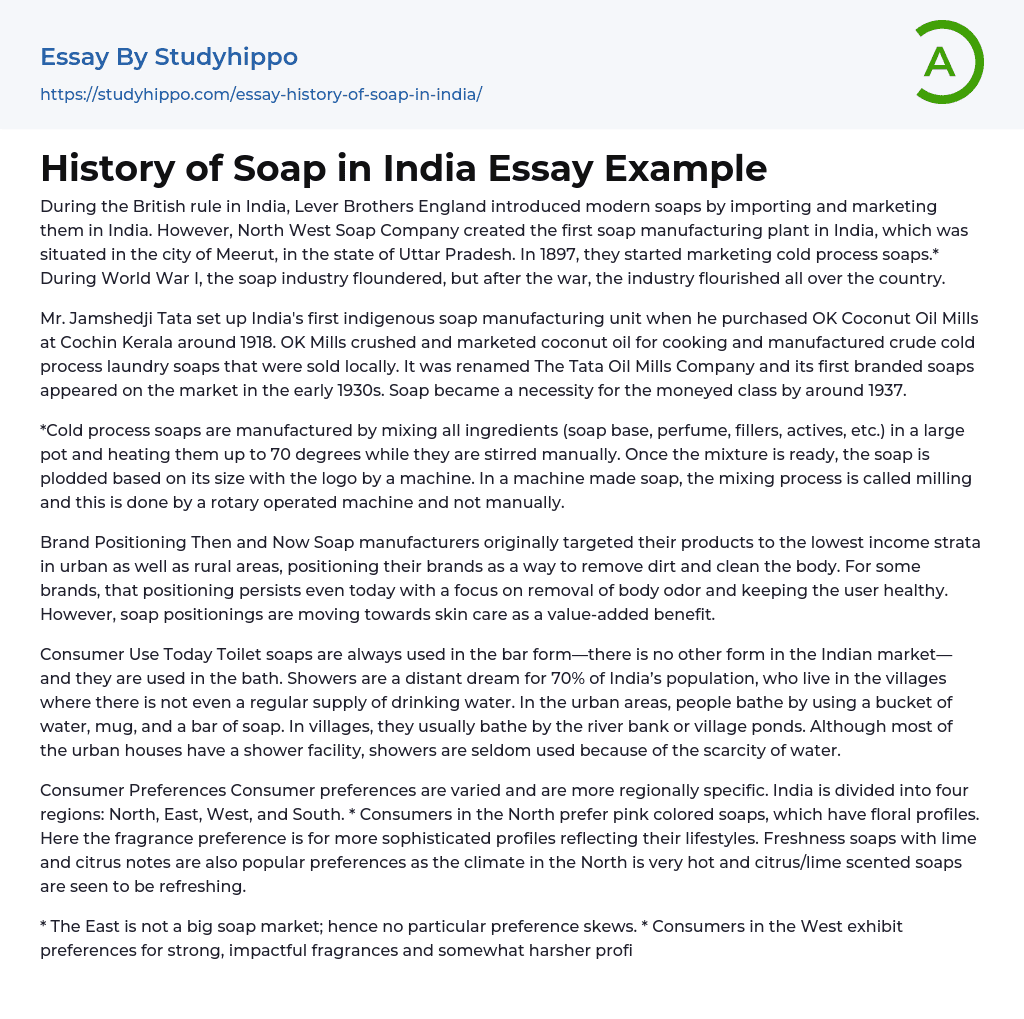During the British rule in India, Lever Brothers England introduced modern soaps by importing and marketing them in India. However, North West Soap Company created the first soap manufacturing plant in India, which was situated in the city of Meerut, in the state of Uttar Pradesh. In 1897, they started marketing cold process soaps.* During World War I, the soap industry floundered, but after the war, the industry flourished all over the country.
Mr. Jamshedji Tata set up India's first indigenous soap manufacturing unit when he purchased OK Coconut Oil Mills at Cochin Kerala around 1918. OK Mills crushed and marketed coconut oil for cooking and manufactured crude cold process laundry soaps that were sold locally. It was renamed The Tata Oil Mills Company and its first branded soaps appeared on the market in the
...early 1930s. Soap became a necessity for the moneyed class by around 1937.
*Cold process soaps are manufactured by mixing all ingredients (soap base, perfume, fillers, actives, etc.) in a large pot and heating them up to 70 degrees while they are stirred manually. Once the mixture is ready, the soap is plodded based on its size with the logo by a machine. In a machine made soap, the mixing process is called milling and this is done by a rotary operated machine and not manually.
Brand Positioning Then and Now Soap manufacturers originally targeted their products to the lowest income strata in urban as well as rural areas, positioning their brands as a way to remove dirt and clean the body. For some brands, that positioning persists even today with a focus on removal of body odor and keeping the user healthy
However, soap positionings are moving towards skin care as a value-added benefit.
Consumer Use Today Toilet soaps are always used in the bar form—there is no other form in the Indian market—and they are used in the bath. Showers are a distant dream for 70% of India’s population, who live in the villages where there is not even a regular supply of drinking water. In the urban areas, people bathe by using a bucket of water, mug, and a bar of soap. In villages, they usually bathe by the river bank or village ponds. Although most of the urban houses have a shower facility, showers are seldom used because of the scarcity of water.
Consumer Preferences Consumer preferences are varied and are more regionally specific. India is divided into four regions: North, East, West, and South. * Consumers in the North prefer pink colored soaps, which have floral profiles. Here the fragrance preference is for more sophisticated profiles reflecting their lifestyles. Freshness soaps with lime and citrus notes are also popular preferences as the climate in the North is very hot and citrus/lime scented soaps are seen to be refreshing.
* The East is not a big soap market; hence no particular preference skews. * Consumers in the West exhibit preferences for strong, impactful fragrances and somewhat harsher profiles compared to the North. Preferences are more for the pink soaps with floral fragrances, primarily rose, which are positioned on the beauty platform. * In the South, the skew is towards specific soap segments like the Herbal/Ayurvedic profiles and also the Sandal profiles. Consumers here do not exhibit high brand loyalty and are ready to experiment and try out
new brands. Hence, most fast moving consumer goods companies tend to launch their new brands in these markets, which they call test launch markets.
- Wal-Mart essays
- Discover essays
- Chief Executive Officer essays
- Convenience Store essays
- Firm essays
- Training And Development essays
- Unilever essays
- Variable Cost essays
- Virgin Group essays
- Bargaining essays
- Entity essays
- Pest analysis essays
- Russian Empire essays
- Ancient Greece essays
- British Empire essays
- Historical Figures essays
- Nazi Germany essays
- Roman Empire essays
- War essays
- Revolution essays
- 19Th Century essays
- Historiography essays
- History of the United States essays
- 20Th Century essays
- World History essays
- Vikings essays
- Declaration of Independence essays
- Civilization essays
- Evidence essays
- Genocide essays
- Colonialism essays
- Rebellion essays
- 1960S essays
- 1920S essays
- 1950S essays
- Letter from Birmingham Jail essays
- Louisiana Purchase essays
- The Columbian Exchange essays
- World Hunger essays
- What is History essays
- Bravery essays
- Gilded Age essays
- Vladimir Lenin essays
- Alexander The Great essays
- Sparta essays
- Victorian Era essays
- Henry v essays
- Stonehenge essays
- Frederick Douglass essays
- Mahatma Gandhi essays




